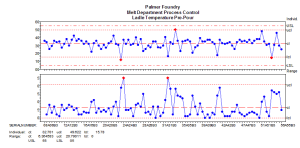Palmer Foundry, based in Palmer, Massachusetts is a small, privately owned specialty foundry. Palmer operates with low overhead from its two facilities; approximately 80 percent of the company’s 75 employees are shop floor and maintenance workers. It uses advanced casting technologies to produce aluminum castings to meet highly demanding specifications for the semiconductor manufacturing equipment industry and other industries as well. Customers expected that qualified vendors had a continuous improvement program in place; one that encompassed the entire supply chain from raw materials to the final product shipping dock. Delivering good products on schedule was no longer good enough for Palmer’s clients. If Palmer Foundry wanted to remain on the approved vendor list and continue to sell castings to the semi-conductor equipment manufacturing industry; it needed to implement a data-driven, continuous improvement approach to be able to deliver perfect castings essentially 100 percent of the time.
Part of the foundry’s challenge was to convince customers that it could produce aluminum castings that could deliver the required performance characteristics. The foundry previously collected a significant amount of shop floor data and stored the information in three-ring binders, multiple spreadsheets, and disparate databases. Some were available on the network, and some were not. The data was reviewed only to see if the processes or raw materials were within specification, but not analyzed to determine if processes were in control, trending out of control, or any other abnormal conditions were present. In lieu of in-house Statistical Process Control (SPC) resources, the company needed a solution that could easily link disparate data sources and Excel spreadsheets for analysis and visualization.
To support its customer-mandated continuous improvement efforts, Palmer Foundry selected and implemented an enterprise manufacturing intelligence (EMI) application from Northwest Analytics. This was a very fast implementation, less than three weeks. Palmer has been able to apply manufacturing analytics designed to manage the production process to all parts of the supply chain cycle – from raw material suppliers to in-process data collection and finally downstream to customers.
The system was installed about two years ago. It tracks, monitors, and validates incoming raw materials such as sand and aluminum ingots. The analytics helps the company monitor the sand used for castings before it has left the quarry and monitor ingot chemistry before it leaves the warehouse. The foundry uses the information to determine potential issues and it can accept or reject sand shipments at the source. The company also uses this information to make in-process modifications. In one example cited, using ingots with low titanium content would have forced the company to remake parts. Instead, Palmer preemptively adjusted its recipe settings and continued producing castings. By avoiding making bad product the foundry was able save about $750,000 of lost production, a substantial sum for a relatively small company such as this.
According to general manager, Jim Lagrant, who spoke at ARC Advisory Group’s annual forum, the analytics software has impacted Palmer’s relationship with its suppliers: “They know that we are more savvy today and that we will hold them to deliver what we want, when we want it.”
The solution includes in-process control charts that show whether or not a process is within specification. For example, Palmer implemented a control chart of the resin binder it uses to hold the sand molds together. If the sand has too little resin, the mold will break apart. If the sand has too much resin, it will take extra labor to remove the casting from the sand mold.
The company also tracks scrap on a weekly basis and has set targets to help reduce rework. The charts are available on the plant floor, providing operators with better visibility into the process. Dashboards illustrate how scrap and rework costs affect the business.
After using the system on the shop floor for ten months, Palmer Foundry extended the technology to provide decision support for management in a variety of business operations, including:
• Sales (bookings, shipping, backlog)
• Customer satisfaction information – (on-time-delivery, external scrap)
• Productivity improvement measurements (shipment dollars-per-hour, percent overtime)
• Environmental, health and safety
The same dashboards used in operations are now used by every decision maker in the company. The software manages how Palmer allocates resources, makes workforce adjustments, and modifies incentives. By using the application to monitor capital spending, employees can determine how their actions will impact the business.
Customer loyalty and brand reputation are very important in this business. “Shipping bad product is one of the worst things that can happen, because we live and die based on customer feedback, our reputation, and word of mouth,” emphasized Mr. Lagrant. According to Mr. Lagrant, customers who visit the foundry are very impressed with the improvements the software has helped it make. The technology has helped the foundry win new projects.


















Leave a Reply